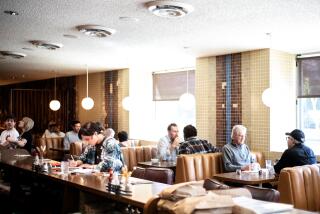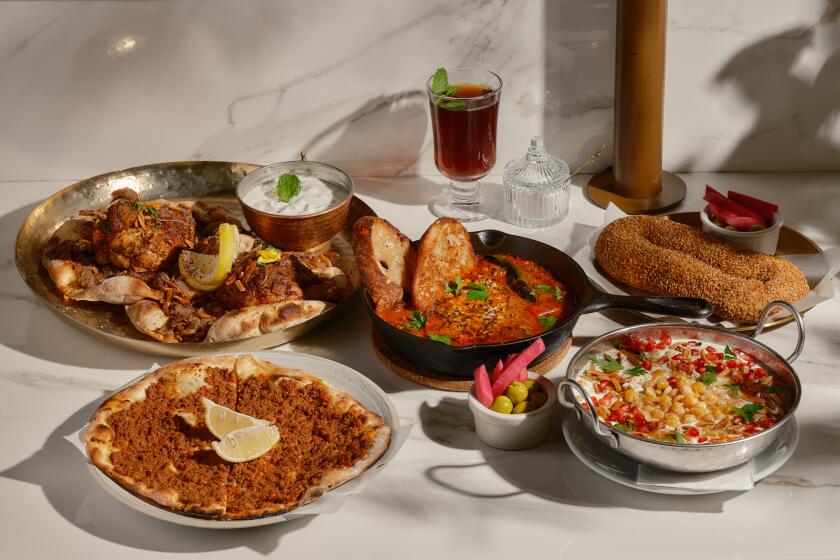Hungering for fatty comfort foods of home
The guilt. The shame. I live in Paris, the world capital of cuisine, home of melt-in-your-mouth foie gras, hundreds of varieties of cheese, ooh-la-la chocolate souffle, pastry so light it crumbles at a glance. But all I want is a cheeseburger.
I love French food. I’m not homesick or pregnant. What’s wrong with me? Why, at the moment, would I rather eat at In-N-Out Burger than at Taillevent?
For the record:
12:00 a.m. Aug. 8, 2004 For The Record
Los Angeles Times Tuesday August 03, 2004 Home Edition Main News Part A Page 2 National Desk 1 inches; 29 words Type of Material: Correction
Her World -- The Her World column in Sunday’s Travel section reported the Japanese name of a seafood, eel, as uni. Uni is sea urchin roe. Eel is unagi.
For The Record
Los Angeles Times Sunday August 08, 2004 Home Edition Travel Part L Page 3 Features Desk 0 inches; 28 words Type of Material: Correction
Her World -- The Aug. 1 Her World column incorrectly reported the Japanese name of a seafood, eel, as uni. Uni is sea urchin roe. Eel is unagi.
Whenever I’m away for more than a month -- and I’ve been in Paris since March -- I start craving foods I take for granted or never touch at home. The stomach is the home of the emotions, yogis say. Maybe mine is more American than I ever thought.
We’re talking about a profound desire for mashed potatoes, pancakes, coleslaw, macaroni and cheese (preferably from a box), BLTs and, of course, the inimitable American burger -- with ketchup. Do you know how hard it is to get ketchup in Europe? Mustard they have, but it’s usually the fancy stuff from Dijon, a sacrilege on fries.
Of course, the French have fries. They and the Belgians claim to have invented them. But in both they eat them with vinegar and mayonnaise, which suggests that Europeans don’t really understand fried potatoes, whatever their provenance.
Fries, a.k.a. frites, are one of the few foods that travel well, figuratively speaking. I’ve had good ones in places as diverse as Tonga and Amsterdam. The same, I think, is true of Greek sandwiches, carved from big gleaming slabs of lamb in hole-in-the-wall restaurants around the world.
It’s all about grease, which is, admittedly, bad for you, but pure, unadulterated fuel for the weary wayfarer.
These days, you can get pizza almost anywhere, but it isn’t a good traveler. Those who disagree simply haven’t eaten a pitch-perfect Margherita in Naples, Italy, where pizza was born and ought best to be enjoyed.
Apparently, fresh eel doesn’t travel well either. Japanese eel, or uni, is my sister Martha’s favorite food. But recently, when she tried fresh eel on Lipari, an Italian island in the Tyrrhenian Sea, she didn’t care for the preparation.
And imagine my poor father, on a monthlong family trip to Japan to see his uni-loving daughter, who lived there in the late ‘60s. He did everything he could to fit in but still missed his morning eggs cooked American-style. So my sister ordered him an omelet for breakfast. Expecting Denny’s, my father took a bite and immediately discovered the eggs were stone cold, which is how many people in other nations eat them. We respected that but felt disappointed for Dad.
We have the idea that food from a certain place can never be as good when it’s prepared and served somewhere else. Of course, it’s all a matter of taste and sophistication.
After a month in China, consuming mostly dumplings and beer, I decided that Chinese food is much better in New York than in China. But that was clearly due to my lack of culinary knowledge and bravery. I had some dog in Beijing but maybe should have tried snake in Shanghai.
Hamburgers are, undeniably, best in the U.S. We all have our favorites; mine is In-N-Out in California and the fast food chain Steak ‘n Shake in the Midwest. Burgers aren’t complicated to make, so why should it be so hard to find a good one in Germany, where I spent a week last month?
I did my best to eat plenty of bratwurst, I drank beer instead of wine, and I tried a strudel or two. Eating in country, I tell myself, is what a traveler ought to do. But then my craving got the better of me, and I ordered a burger from room service in the Dresden Hilton Hotel. The ketchup came in a pretty pastry shell, but the meat was drier than jerky.
Later, I tried another hamburger at a restaurant in the hip Neustadt section of town, where American food is just another cheap, ethnic cuisine. The young bartender at the restaurant spoke idiomatic English and showed as much skin between her pants and shirt as a Valley Girl. Then the burger came with sour cream onion dip the way my mother used to make it -- but, to my horror, accompanied by bread instead of chips.
Happily, I have not always been dismayed by American favorites in faraway places. At Coffee Parisien, a chain of restaurants in Paris and environs, the burgers, spinach salads, eggs Benedict and club sandwiches are better than in the U.S. This is thanks, owner Jonathan Goldstein says, to his predilection for homemade recipes and butcher-cut meat, with just enough fat to make burgers tasty.
Goldstein, who grew up in New Hampshire and moved with his parents to Paris when he was 10, has decorated the restaurants with images from his JFK-era youth. He says the French aversion to American food has changed, that you can get a brownie in many Parisian bakeries.
Still, his bagels come, frozen, from H&H; on the Upper West Side of New York. Right now, I could eat a couple of those, barring the miraculous appearance of a cheeseburger.
Besides Her World, Susan Spano also writes “Postcards From Paris,” which can be read at www.latimes.com/susan spano. You may e-mail her at postcards@latimes.com. She regrets she cannot respond individually.
More to Read
Eat your way across L.A.
Get our weekly Tasting Notes newsletter for reviews, news and more.
You may occasionally receive promotional content from the Los Angeles Times.






